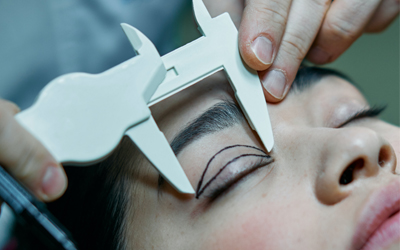Ectropion surgery is performed to fully correct the condition in which the eyelid turns outward leaving the inner eyelid surface exposed and prone to irritation.

Some facts about Ectropion surgery:
- Ectropion generally affects only the lower eyelid and is more common in older adults.
- The entire length of the eyelid is turned out in severe ectropion. Only one segment of the eyelid sags away from the eye in less severe ectropion.
- Symptoms of ectropion can be relieved by using artificial tears and lubricating ointments.
- Your lower lid pulls away from your eye and tears don't drain properly into the puncta if you have ectropion.
- Your tears may pool and constantly flow over your eyelids without proper drainage causing excessive tearing.
- You will feel feel dry, gritty and sandy eyes because of Ectropion.
- Stagnant tears or dry eyes can irritate your eyes, resulting in a burning sensation and redness in your eyelids and the whites of your eyes.
- The surface of the cornea get irritated because of stagnant tears or dry eyes, making you sensitive to light.
- Age, Eyelid rubbing, Repeated eyelid pulling, Floppy eyelid syndrome, Long term use of eye drops, Skin conditions which involve the eyelid, Trauma and Prior Eyelid Surgery are some of the risk factors of Ectropion.

Preparation for Ectropion surgery:
- Blood thinning medications such as aspirin, clopidogrel, rivaroxaban and warfarin should be stoped before the surgery as these can make bleeding more likely during and after surgery.
- Anti-inflammatory drugs like ibuprofen Nurofen, fish oil, ginger, ginseng and garlic containing supplements should be stopped two weeks before surgery.
- A routine eye exam and physical will be done by your doctor to diagnose Ectropion in which your eyelids will be pulled or ask you to close your eyes forcefully to assess each eyelid's muscle tone and tightness.
- The surrounding tissue will be examined as well if your ectropion is caused by a scar, tumor, previous surgery or radiation.
- The correct treatment or surgical technique will be chosen by understanding the cause of ectropion.
- Artificial tears and ointments will be recommended by the doctor to ease the symptoms if your ectropion is mild.
Procedure for Ectropion surgery:
- Usually, the surgery takes 30 minutes to an hour, depending on whether the operation involves both eyes.
- The type of surgery to be performed depends on the condition of the tissue surrounding your eyelid and on the cause of your ectropion. These include:
- You'll receive a local anesthetic to numb your eyelid and the area around it before surgery.
- Oral or intravenous medication may be given to make you more comfortable, which depends on the type of procedure you are having and whether it's done in an outpatient surgical clinic.
- Ectropion caused by muscle and ligament relaxation due to aging:
- Asmall part of your lower eyelid at the outer edge will be removed by the surgeon in this case. The tendons and muscles of the lid will be tightened, causing the lid to rest properly on the eye when the lid is stitched back together.
- Generally this procedure is relatively simple.
- Ectropion caused by scar tissue from injury or previous surgery:
- A skin graft, from your upper eyelid or behind your ear will be taken and used by the surgeon to help support the lower lid in this case.
- You might need a second procedure to completely correct your ectropion if you have facial paralysis or significant scarring.
Recovery from Ectropion surgery:
- You should keep the operated area relatively dry for 7 days.
- You might need to wear an eye patch for 24 hours after surgery.
- An antibiotic and steroid ointment should be used on your eye several times a day for one week.
- Cold compresses should be used periodically to decrease bruising and swelling.
- You will likely experience temporary swelling and bruising on and around your eye after surgery.
- You should not wipe your eyes excessively, as this can pull on the eyelid and make the problem worse.
- It is best to do this gently and wipe upwards and inwards that is towards your nose if you need to wipe your eyes.
- You may be advised to tape your eyelids closed at night with special skin tape if an operation is recommended as a temporary measure to help protect your eyes while you wait to have surgery.
- Sometimes a watery eye may persist even after successful ectropion surgery which is because the non-functioning of tear ducts and this may be corrected with further surgery if necessary.
- Avoid wearing your contact lenses or eye make-up for at least two weeks following surgery. However, you may need to avoid for longer if the eye remains red.
